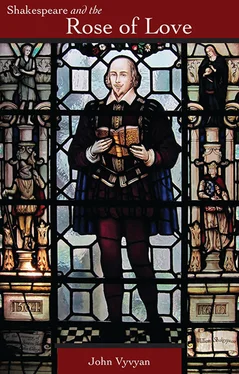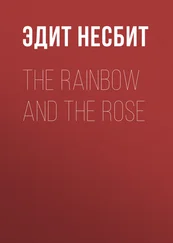And, among three, to love the worst of all;
A whitely wanton with a velvet brow,
With two pitch-balls stuck in her face for eyes;
Ay, and, by heaven, one that will do the deed,
Though Argus were her eunuch and her guard:
And I do sigh for her! to watch for her!
To pray for her! Go to; it is a plague…
But it is these base-seeming creatures who will re-educate the scornful lords.
It may also be well to notice, parenthetically, that what I have termed technique and device is by no means wholely artificial; it has a correspondence with psychological facts that seem to have been better understood in the thirteenth century than in the nineteenth, although psychoanalysis is now beginning to rediscover them. The object of love needs to be distinguished from love’s power or cause, for they are disproportionate; and a tradition which recognizes a transcendence, conveniently symbolized as a god, although many other symbols will serve, is in some degree a safeguard against certain devastating emotional states – such as that which poor Hazlitt records of himself in the Liber Amoris – which may occasionally become suicidal or insane.
After the ludicrous dispute on the divinity of sweethearts, the king calls for calm:
Then leave this chat; and, good Berowne, now prove
Our loving lawful, and our faith not torn.
Dumain also requests, ‘Some salve for perjury’, and Berowne supplies it in his celebrated speech.
This is of particular interest from several points of view. In the first place it is really two speeches. The original ends at line 317, *and at some unknown later date, Shakespeare expanded it. What we now possess is two versions running consecutively. When Shakespeare refashions his earlier work in this manner, it is never for the sake of padding, but usually to present some new idea to which he has come to attribute special importance. By separating the two versions, we see immediately what the fresh conception is:
But love, first learned in a lady’s eyes,
Lives not alone immured in the brain,
But, with the motion of all elements,
Courses as swift as thought in every power,
And gives to every power a double power
Above their functions and their offices…
Never durst poet touch a pen to write
Until his ink were temper’d with love’s sighs:
O, then his lines would ravish savage ears,
And plant in tyrants mild humility…
It is religion to be thus forsworn;
For charity itself fulfils the law,
And who can sever love from charity?
These lines carry us far away from romantic comedy: Shakespeare is saying that love is power. It is a power that can quell tyranny, a power that in itself fulfils the law. We cannot be sure that at this period he foresaw the mighty employment to which he would put this assertion; but it contains the principle by which, in his culminating plays, he resolves tragedy, not simply by arresting its course, but by transforming it into regeneration. In Measure for Measure , for instance, it is self-knowledge and love which transmute seeming virtue into forth-going virtue, that is, into the power by which, and by which alone, the death-ward movement is brought to a stop, and an impulse towards life is imparted.
To speak of love as power may be commonplace; but to believe it is astonishing. In fact, one has to look to the great religious figures – the Christ or the Buddha – to find a consistent application of love to human affairs. Neither Church nor State believes it to be practicable; and both enforce their decrees by other means. Did Shakespeare really have this faith? We can only say that his plays proclaim it, and that he resolves tragedy on that assumption. Whatever his personal belief may have been, the proposition that love is power becomes an important part of what we may call his ‘dramatic’ religion.
The inserting, at a later date, of this new conception into Berowne’s speech, shatters the logical continuity of Love’s Labour’s Lost . If Berowne had really reached this pinnacle by the end of the fourth act, then much of the fifth, which is designed to bring the lovers to a realization that never becomes as great as this, would be irrelevant. To follow the original development of the play, we must therefore confine our attention to the earlier version of his speech, concluding with the lines:
Then when ourselves we see in ladies’ eyes,
Do we not likewise see our learning there?
This part is entirely in character; and without being profound, it is none the less a stage in the gradual deepening of the ideas of love and learning which Berowne was merely toying with in act one:
Study me how to please the eye indeed,
By fixing it upon a fairer eye…
He did this when he met Rosaline; and the consequences were so disturbing that he tried to defend himself from them by denigration – ‘two pitch-balls stuck in her face for eyes!’ But nothing can save him from Shakespeare’s decision that his understanding is due to be quickened. As he gazes into the balls of pitch, they are transmuted to crystal, in which he beholds a vision:
From women’s eyes this doctrine I derive:
They are the ground, the books, the academes
From whence doth spring the true Promethean fire.
It may be that one’s sweetheart’s eyes are a natural source of revelation; but Shakespeare is certainly not copying nature in this context; he is observing, without parody or satire, an established rite in the ‘religion’ of love.
Quiller-Couch has remarked: ‘The reader who takes the trouble to go through Love’s Labour’s Lost marking every allusion to women’s eyes will be positively confounded by their number until it breaks on him that however many, however puzzling, its separate topical riddles may be, here – and precisely here – lies the secret of the play.’ The final form of the play is concerned with a deeper secret; but eyes might have been the secret of the first version, to which it would have been appropriate. But a secret, even a little one, invites us to do more than take note of its existence, it requires penetration. Berowne derives his doctrine from Rosaline’s eyes, but Shakespeare had it from other sources. It is worth while to take a glance at them, because this is not the only occasion on which their influence is considerable.
A possible source for the ritual of the eye is, once again, Chaucer’s fragmentary translation of The Romance of the Rose . As this poem is cast in the form of a dream, we may call its young hero the dreamer, until, after being struck by the arrows, he becomes the lover. When he enters the garden of the Rose, he is invited to join the dance; and when that is over, he is left alone. The other dancers drift away in couples, and as he sees them go, he thinks that only a great fool would not long for such a life, since to have the love of one’s choice is heaven:
For better lyfe durst him not care
For there nys so good paradyse
As to haue a loue at his deuyse… 1326
He wanders through the garden alone; but all the while the god of love is stalking him, an arrow ready for his bow. The dreamer feels apprehensive at this; he senses that there may be more to love than delight, that there may be much peril in it and pain; and he prays that if the god should loose the arrow, it will not cause a mortal wound:
Nowe god that sytteth in maieste
Fro deedly woundes he kepe me
If so be that he had me shete
For if I with his arowe mete
It had me greued sore ywis… 1343
It seems as if, like Berowne, he would prefer to take love lightly. When he has explored all the beauties of the garden, he comes to the spring of Narcissus, and again feels a pang of alarm. Narcissus was punished for selfishly withholding love, and the dreamer is at first reluctant to look into the water. Then he reassures himself that, as he is not disdainful, he will be in no danger, and he approaches the fountain. Whoever looks into it is sure to fall in love.
Читать дальше











